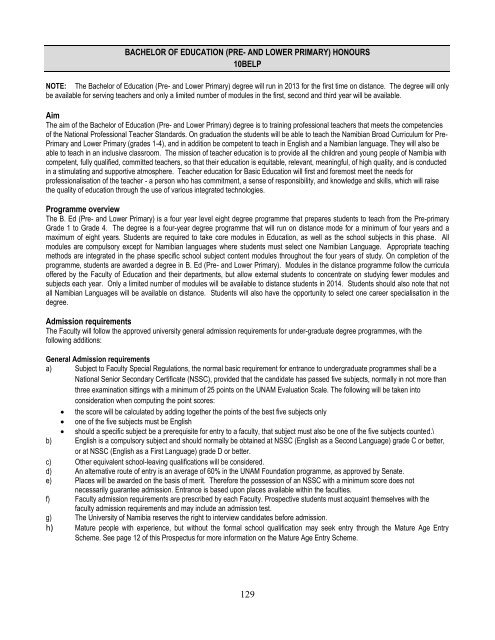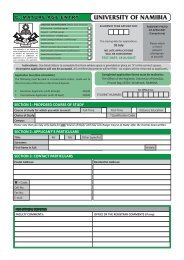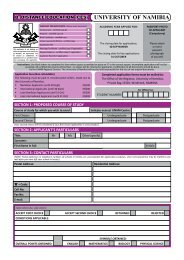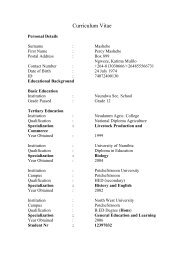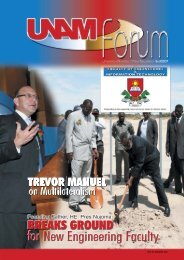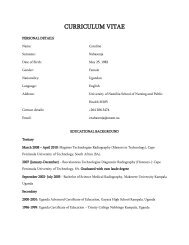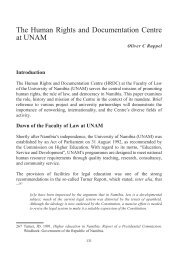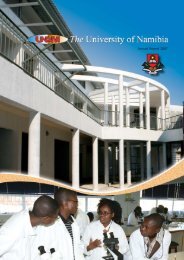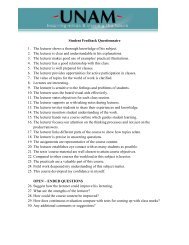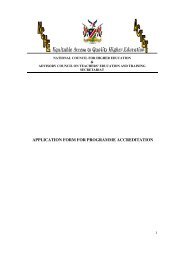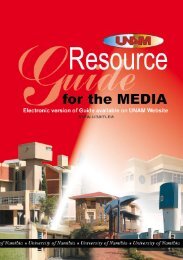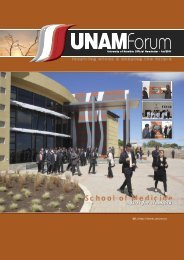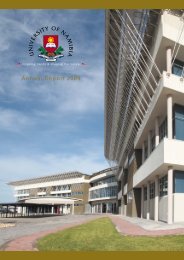UNIVERSITY OF NAMIBIA CENTRE FOR EXTERNAL STUDIES ...
UNIVERSITY OF NAMIBIA CENTRE FOR EXTERNAL STUDIES ...
UNIVERSITY OF NAMIBIA CENTRE FOR EXTERNAL STUDIES ...
You also want an ePaper? Increase the reach of your titles
YUMPU automatically turns print PDFs into web optimized ePapers that Google loves.
BACHELOR <strong>OF</strong> EDUCATION (PRE- AND LOWER PRIMARY) HONOURS10BELPNOTE: The Bachelor of Education (Pre- and Lower Primary) degree will run in 2013 for the first time on distance. The degree will onlybe available for serving teachers and only a limited number of modules in the first, second and third year will be available.AimThe aim of the Bachelor of Education (Pre- and Lower Primary) degree is to training professional teachers that meets the competenciesof the National Professional Teacher Standards. On graduation the students will be able to teach the Namibian Broad Curriculum for Pre-Primary and Lower Primary (grades 1-4), and in addition be competent to teach in English and a Namibian language. They will also beable to teach in an inclusive classroom. The mission of teacher education is to provide all the children and young people of Namibia withcompetent, fully qualified, committed teachers, so that their education is equitable, relevant, meaningful, of high quality, and is conductedin a stimulating and supportive atmosphere. Teacher education for Basic Education will first and foremost meet the needs forprofessionalisation of the teacher - a person who has commitment, a sense of responsibility, and knowledge and skills, which will raisethe quality of education through the use of various integrated technologies.Programme overviewThe B. Ed (Pre- and Lower Primary) is a four year level eight degree programme that prepares students to teach from the Pre-primaryGrade 1 to Grade 4. The degree is a four-year degree programme that will run on distance mode for a minimum of four years and amaximum of eight years. Students are required to take core modules in Education, as well as the school subjects in this phase. Allmodules are compulsory except for Namibian languages where students must select one Namibian Language. Appropriate teachingmethods are integrated in the phase specific school subject content modules throughout the four years of study. On completion of theprogramme, students are awarded a degree in B. Ed (Pre- and Lower Primary). Modules in the distance programme follow the curriculaoffered by the Faculty of Education and their departments, but allow external students to concentrate on studying fewer modules andsubjects each year. Only a limited number of modules will be available to distance students in 2014. Students should also note that notall Namibian Languages will be available on distance. Students will also have the opportunity to select one career specialisation in thedegree.Admission requirementsThe Faculty will follow the approved university general admission requirements for under-graduate degree programmes, with thefollowing additions:General Admission requirementsa) Subject to Faculty Special Regulations, the normal basic requirement for entrance to undergraduate programmes shall be aNational Senior Secondary Certificate (NSSC), provided that the candidate has passed five subjects, normally in not more thanthree examination sittings with a minimum of 25 points on the UNAM Evaluation Scale. The following will be taken intoconsideration when computing the point scores: the score will be calculated by adding together the points of the best five subjects only one of the five subjects must be English should a specific subject be a prerequisite for entry to a faculty, that subject must also be one of the five subjects counted.\b) English is a compulsory subject and should normally be obtained at NSSC (English as a Second Language) grade C or better,or at NSSC (English as a First Language) grade D or better.c) Other equivalent school-leaving qualifications will be considered.d) An alternative route of entry is an average of 60% in the UNAM Foundation programme, as approved by Senate.e) Places will be awarded on the basis of merit. Therefore the possession of an NSSC with a minimum score does notnecessarily guarantee admission. Entrance is based upon places available within the faculties.f) Faculty admission requirements are prescribed by each Faculty. Prospective students must acquaint themselves with thefaculty admission requirements and may include an admission test.g) The University of Namibia reserves the right to interview candidates before admission.h) Mature people with experience, but without the formal school qualification may seek entry through the Mature Age EntryScheme. See page 12 of this Prospectus for more information on the Mature Age Entry Scheme.129


